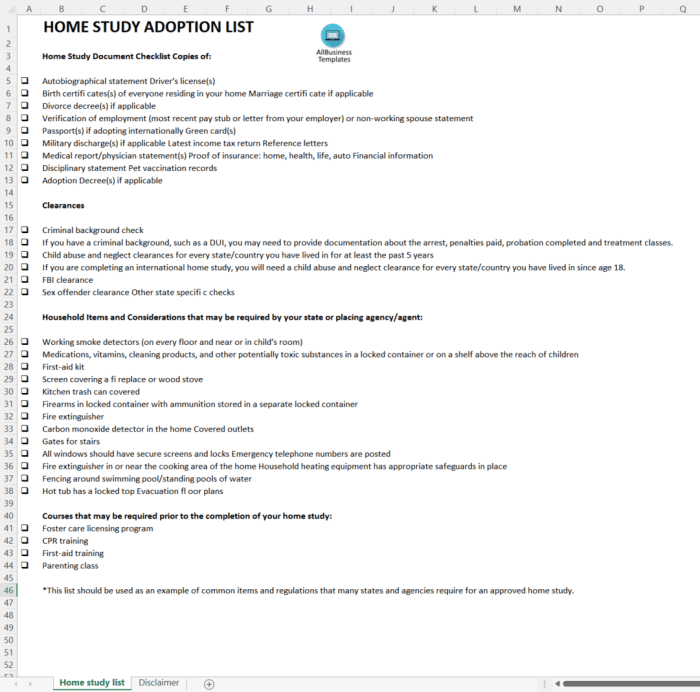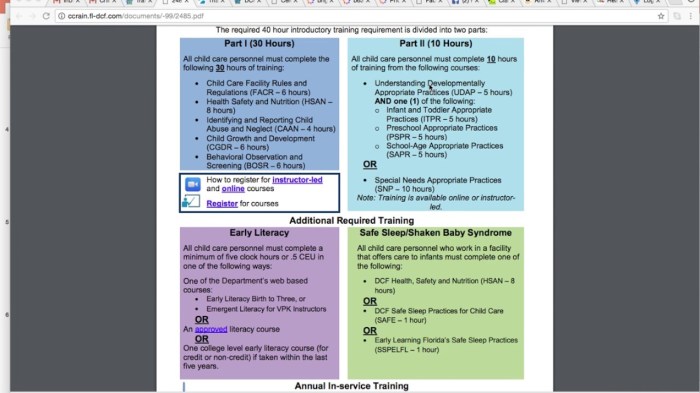The DCF Home Study Checklist Florida provides a comprehensive overview of the requirements and processes involved in adopting a child in the state of Florida. This checklist ensures that prospective adoptive parents meet the necessary legal and ethical standards to provide a safe and nurturing environment for children.
This guide delves into the eligibility requirements, home environment assessment, family dynamics and relationships, financial stability and resources, support systems and community involvement, parenting experience and knowledge, motivation and commitment, health and well-being, and the Home Study Report.
Introduction
A DCF Home Study Checklist in Florida is a crucial document used by the Department of Children and Families (DCF) to evaluate the suitability of a home environment for a child who is being considered for adoption or foster care.
The purpose of the checklist is to provide a comprehensive assessment of the home, the family, and the prospective parents to ensure that the child will be placed in a safe, nurturing, and supportive environment.
The home study process involves a thorough investigation of the family’s history, financial stability, parenting skills, and overall ability to provide a healthy and stable home for the child. The checklist serves as a guide for the social worker conducting the home study, ensuring that all relevant areas are covered during the assessment.
Legal and Ethical Considerations
The DCF Home Study Checklist is rooted in legal and ethical principles that prioritize the well-being and safety of the child. The legal framework governing adoption and foster care in Florida, including statutes and regulations, establishes the criteria for evaluating prospective parents and ensuring that the child’s best interests are paramount.
Ethical considerations also play a significant role in the home study process. Social workers are bound by professional ethics to conduct the assessment with objectivity, confidentiality, and respect for the family’s privacy. They must ensure that the child’s needs are at the forefront of their decision-making and that the assessment is conducted in a fair and unbiased manner.
Eligibility Requirements

To be eligible to adopt a child in Florida, prospective adoptive parents must meet specific requirements established by the state. These requirements are designed to ensure that adoptive parents are capable of providing a stable, loving, and supportive home for a child.
The eligibility requirements for adoptive parents in Florida include:
- Being at least 18 years of age
- Being a resident of Florida for at least six months
- Having a stable income and financial resources to support a child
- Having a clean criminal history and no history of child abuse or neglect
- Being in good physical and mental health
- Having a support system of family and friends
- Having completed an approved home study
Documentation and Background Checks
Prospective adoptive parents must submit a variety of documentation to prove that they meet the eligibility requirements. This documentation includes:
- Birth certificate
- Driver’s license or state ID card
- Proof of income
- Criminal history report
- Child abuse and neglect history report
- Medical and mental health records
- References from family and friends
In addition to submitting documentation, prospective adoptive parents must also undergo a series of background checks. These background checks include:
- A criminal history check
- A child abuse and neglect history check
- A credit check
- A home safety inspection
Home Environment Assessment
Assessing the home environment is a crucial step in the DCF home study process in Florida. It involves evaluating the safety, stability, and overall suitability of the home for children. The assessment aims to ensure that the living environment provides a nurturing and protective space for the well-being of children.
During the home environment assessment, social workers or other designated professionals conduct a thorough inspection of the home. They examine various aspects, including the physical condition, cleanliness, accessibility, and any potential hazards.
Physical Condition
The physical condition of the home is evaluated to determine its structural integrity and safety. Inspectors check for any signs of damage, disrepair, or potential hazards. They assess the condition of the roof, walls, floors, windows, and doors to ensure they are in good working order and pose no risks to children.
Cleanliness
Cleanliness is an essential aspect of a healthy and nurturing home environment. Inspectors evaluate the overall cleanliness of the home, including the presence of dirt, dust, clutter, or any unsanitary conditions. They also assess the availability of basic amenities such as running water, a functioning bathroom, and a clean kitchen for food preparation.
Accessibility
Accessibility is crucial for ensuring that children can safely and easily navigate the home. Inspectors check for any barriers or obstacles that could hinder a child’s movement, such as narrow hallways, steep stairs, or blocked exits. They also assess the accessibility of common areas, bedrooms, and bathrooms for children with disabilities or special needs.
Family Dynamics and Relationships
Assessing family dynamics and relationships is crucial in the adoptive family study process. It provides insights into the family’s communication patterns, conflict resolution strategies, and parenting skills, which are essential for creating a stable and nurturing environment for the adopted child.Evaluating
family dynamics involves observing interactions between family members, interviewing parents and children individually and as a group, and reviewing family history and records. By understanding the family’s strengths and challenges, social workers can assess their readiness to provide a supportive and loving home for the child.
Communication
Effective communication is vital for maintaining healthy relationships within the family. Social workers assess how family members express their thoughts, feelings, and needs, and how they listen and respond to each other. Open and respectful communication fosters understanding, empathy, and cooperation.
Conflict Resolution
Families inevitably experience conflicts, but how they are resolved is crucial. Social workers evaluate the family’s conflict resolution strategies, including their ability to identify and discuss issues, negotiate solutions, and compromise. Healthy conflict resolution skills promote a positive family atmosphere and prevent unresolved issues from escalating into major problems.
Parenting Skills
Parenting skills are essential for providing a stable and nurturing environment for the adopted child. Social workers assess the parents’ knowledge of child development, their ability to provide appropriate care, and their willingness to learn and adapt as the child’s needs change.
Effective parenting skills contribute to the child’s physical, emotional, and social well-being.
Financial Stability and Resources: Dcf Home Study Checklist Florida

Assessing the financial stability and resources of adoptive parents is crucial to ensure they can provide a secure and stable environment for the adopted child. Adoptive parents must have sufficient income, assets, and a manageable debt-to-income ratio to meet the child’s needs, including expenses related to food, clothing, shelter, healthcare, education, and other activities.
Documentation Required
To demonstrate financial stability, adoptive parents are required to provide documentation, such as:
- Income statements (e.g., pay stubs, tax returns)
- Bank statements
- Investment account statements
- Proof of homeownership or rental agreement
- Credit reports
Support Systems and Community Involvement
Evaluating the support systems and community involvement of adoptive parents is crucial for ensuring the stability and well-being of the adopted child. Strong support systems provide emotional, practical, and financial assistance, while community involvement fosters a sense of belonging and integration.
Types of Support
Support systems for adoptive parents include:
- Family:Extended family members can offer emotional support, childcare, and financial assistance.
- Friends:Close friends can provide companionship, respite care, and a listening ear.
- Community organizations:Local support groups, adoption agencies, and community centers offer resources, information, and peer support.
- Professionals:Therapists, social workers, and pediatricians can provide guidance and support during the adoption process and beyond.
Parenting Experience and Knowledge
Assessing the parenting experience and knowledge of adoptive parents is crucial to ensure the well-being and safety of children placed in their care. It helps determine their readiness to provide a nurturing and stable environment for the child.
Methods for evaluating parenting skills, knowledge of child development, and experience with children include:
Interviews and Observations
- Interviews allow professionals to gather information about the parents’ parenting beliefs, experiences, and expectations.
- Observations of the parents interacting with children provide insights into their parenting skills, attachment styles, and ability to respond to children’s needs.
Background Checks and References
- Background checks reveal any history of child abuse or neglect, which may indicate potential parenting concerns.
- References from previous employers, teachers, or childcare providers can provide information about the parents’ work ethic, reliability, and interactions with children.
Training and Education
- Adoptive parents may participate in training programs to enhance their knowledge of child development, parenting techniques, and adoption-specific issues.
- Evidence of completion of these programs demonstrates their commitment to providing a positive and informed parenting environment.
Motivation and Commitment

Assessing the motivation and commitment of adoptive parents is crucial to ensure they are fully prepared for the challenges and rewards of parenting. This involves exploring their reasons for adoption, understanding their knowledge of the challenges involved, and evaluating their long-term commitment to parenting.
Methods for evaluating motivation and commitment include in-depth interviews, written assessments, and observations of interactions with children. These assessments should delve into the following areas:
Reasons for Adoption
- Explore the adoptive parents’ motivations for adopting, including their desire to provide a loving home, create a family, or meet a personal or societal need.
- Assess their understanding of the unique challenges and rewards of adoption, such as potential genetic or developmental issues and the impact on the child’s identity and relationships.
Understanding of Adoption
- Evaluate the adoptive parents’ knowledge of adoption laws, procedures, and the legal and emotional implications of adoption.
- Assess their understanding of the child’s developmental needs, including the impact of trauma, loss, and attachment issues.
Long-Term Commitment
- Explore the adoptive parents’ plans for parenting the child throughout their childhood and adulthood.
- Assess their willingness to provide a stable and nurturing environment, even in the face of challenges or setbacks.
- Evaluate their understanding of the ongoing support and resources available to adoptive families.
Health and Well-being
Assessing the health and well-being of adoptive parents is crucial in determining their ability to provide a nurturing and stable environment for a child.Physical health factors, such as chronic illnesses or disabilities, must be evaluated to ensure that the parents are capable of meeting the child’s physical needs.
Mental health factors, including any history of mental illness or substance abuse, are also considered, as they can impact the parents’ ability to parent effectively. Emotional health factors, such as resilience and coping mechanisms, are assessed to determine the parents’ ability to handle the challenges and stresses of parenting.
Physical Health
Physical health assessments include a review of medical history, physical examinations, and any necessary diagnostic tests. Adoptive parents should be able to provide adequate physical care for the child, including meeting their nutritional, hygiene, and medical needs.
Mental Health, Dcf home study checklist florida
Mental health assessments involve evaluating the parents’ psychological well-being, including their ability to manage stress, resolve conflicts, and cope with emotional challenges. A history of mental illness or substance abuse may require further evaluation and support to ensure the parents’ stability and ability to parent.
Emotional Health
Emotional health assessments focus on the parents’ emotional resilience, empathy, and ability to form secure attachments. Adoptive parents should be able to provide a nurturing and emotionally supportive environment for the child, fostering their healthy development and well-being.
Home Study Report
The Home Study Report is a comprehensive document that summarizes the findings of the home study assessment. It provides a detailed account of the applicant’s home environment, family dynamics, financial stability, support systems, parenting experience and knowledge, motivation and commitment, health and well-being, and any other relevant factors.
The report is typically organized into several sections, each of which addresses a specific aspect of the assessment. These sections may include:
Applicant Information
- Personal history and background
- Education and employment
- Marital status and family relationships
Home Environment
- Description of the home and neighborhood
- Safety and security of the home
- Adequacy of space and resources for a child
Family Dynamics and Relationships
- Quality of relationships between family members
- Parenting styles and practices
- Communication and conflict resolution patterns
Financial Stability and Resources
- Income and expenses
- Assets and debts
- Ability to provide for a child’s needs
Support Systems and Community Involvement
- Availability of family, friends, and other support systems
- Participation in community activities and organizations
- Access to resources and services
Parenting Experience and Knowledge
- Previous parenting experience
- Knowledge of child development and parenting practices
- Plans for parenting a child
Motivation and Commitment
- Reasons for wanting to adopt or foster
- Level of commitment to parenting
- Understanding of the challenges and rewards of parenting
Health and Well-being
- Physical and mental health of the applicants
- Lifestyle factors and habits
- Ability to provide a safe and nurturing environment for a child
Recommendations and Follow-up Actions
- Recommendations for approval or denial of the adoption or foster care application
- Any necessary follow-up actions or conditions
- Timeline for completing follow-up actions
The Home Study Report is an essential tool for making decisions about adoption or foster care placements. It provides valuable information about the applicant’s suitability as a parent and the ability to provide a safe and nurturing home for a child.
Key Questions Answered
What is the purpose of the DCF Home Study Checklist Florida?
The DCF Home Study Checklist Florida is a comprehensive assessment tool used to evaluate the suitability of prospective adoptive parents in the state of Florida.
What are the key components of the DCF Home Study Checklist Florida?
The checklist covers various aspects, including eligibility requirements, home environment assessment, family dynamics and relationships, financial stability and resources, support systems and community involvement, parenting experience and knowledge, motivation and commitment, health and well-being, and the Home Study Report.
Who conducts the DCF Home Study in Florida?
The home study is typically conducted by a licensed social worker or other qualified professional approved by the Florida Department of Children and Families (DCF).
How long does the DCF Home Study process take?
The duration of the home study process can vary depending on the individual circumstances and the availability of required documentation. However, it generally takes several months to complete.